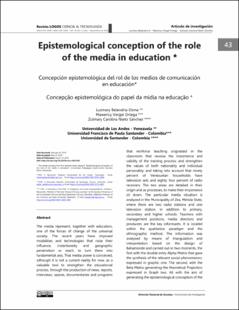Epistemological conception of the role of the media in education
...
Belandria Osma, Luz Mery | 2018-07-01
The media represent, together with education,
one of the forces of change of the universal
society. The recent years have imposed
modalities and technologies that raise their
influence, instantaneity and geographic
penetration or reach, to turn them into
fundamental axis. That media power is conceived,
although it is not a current reality for now, as a
valuable tool to strengthen the educational
process, through the production of news, reports,
interviews, spaces, documentaries and programs
that reinforce teaching originated in the
classroom; that revalue the importance and
validity of the training process; and strengthen
the values of both nationality and individual
personality; and taking into account that ninety
percent of Venezuelan households have
television sets and eighty four percent of radio
receivers. The two areas are detailed in their
origin and as processes, to make their importance
sit down. The particular media situation is
analyzed in the Municipality of Zea, Mérida State,
where there are two radio stations and one
television station, in addition to primary,
secondary and higher schools. Teachers with
management positions, media directors and
producers are the key informants. It is located
within the qualitative paradigm and the
ethnographic method. The information was
analyzed by means of triangulation and
interpretation based on the design of
Bahamonde and carried out in two moments, the
first with the double entry Alpha Matrix that gave
the synthesis of the relevant social phenomenon,
expressed in graphic one. The second, with the
Beta Matrix generating the theoretical Projection
expressed in Graph two. All with the aim of
generating the epistemological conception of the role of the media embodied in the conclusions
and contributions of the research.
LEER










